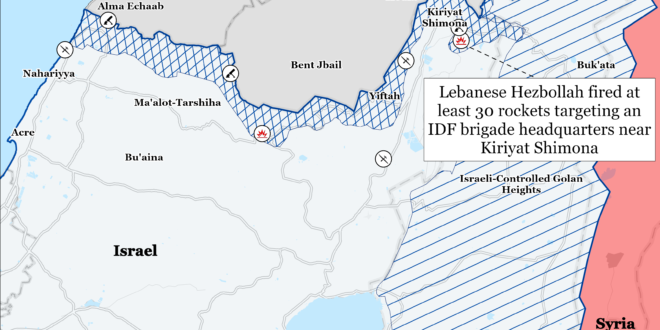Hamas is preserving its forces in Rafah rather than engaging the Israel Defense Forces (IDF), likely because Hamas does not believe Israel’s Rafah operation will be decisive.[i] Israeli journalists traveling with the Israel Defense Forces (IDF) in Rafah reported that Hamas fighters are avoiding becoming decisively engaged, and that Hamas’ fighters have instead remotely detonated houses that were rigged to explode prior to the arrival of Israeli forces in the area.[ii] The IDF has found few Palestinian fighters above ground, with the majority of Hamas fighters remaining in Hamas’ tunnel system underneath Rafah. Israeli journalists added that an unspecified number of Hamas fighters fled north to Khan Younis and Mawasi, both areas that lack an Israeli troop presence.[iii] Israeli forces have killed 550 Palestinian fighters out of an estimated 2,000 fighters, a low number compared to fighting in other areas of the Gaza Strip.[iv] Hamas’ leaders have believed since at least February 2024 that a Rafah operation would fail to destroy its military forces and assess that Hamas is winning the war.[v] Hamas aims to preserve its military capabilities by relocating to safer areas, which maintains the group’s long-term viability and avoids committing to a decisive battle with the IDF in Rafah. The Israeli journalists in Rafah said that Israeli forces are currently considering the Philadelphi Corridor, which the IDF seized, as a long-term asset.[vi] Israeli officials expect that controlling the Philadelphi Corridor will prevent Hamas from importing weapons into the Gaza Strip, as the IDF’s presence cuts off Hamas’ smuggling routes.[vii]
Hamas’ Rafah Brigade would presumably become decisively engaged with Israeli forces if Hamas believed the Rafah operation would destroy Hamas’ military organization. Hamas’ units would defend Rafah if they believed that a successful Israeli operation in Rafah would destroy Hamas. The use of prepared explosively rigged buildings and tunnels suggests that Hamas’ units in Rafah prepared to preserve their strength by avoiding direct engagements. The movement of Hamas’ unit northwards towards Khan Younis and elsewhere allows Rafah units to supplement Khan Younis units and accelerate their reorganization and reconstitution to continue operations against the IDF in the future. Remaining in Rafah would have almost certainly led to the degradation of Hamas units, possibly rendering some combat ineffective and requiring a lengthier reconstitution process.
An IDF commander said that the IDF determines if a Hamas battalion is “dismantled” by assessing whether the IDF has destroyed tunnel systems.[viii] This is partially consistent with an earlier statement from an 89th Commando Brigade battalion commander. The commander said that the IDF destroys Hamas “frameworks” which include Hamas leaders, infrastructure, and equipment. This notably does not appear to include low-level Hamas fighters.[ix]
Hamas representative to Lebanon Ahmad Abdul Hadi said on June 18 that Hamas would still conduct the October 7, 2023, attack on Israel again if given the opportunity to reconsider the decision.[x] Hadi said that the attack was a strategic success that disrupted Israel’s normalization and reemphasized the Palestinian cause. Hadi claimed that Hamas also believed that Israel planned to launch a preemptive strike against the group to safeguard upcoming, unspecified infrastructure plans. No Israeli official, anonymous or otherwise, has made similar claims about an Israeli preemptive strike. Hadi said that the group’s justification for the October 7 attack still exists.
Iranian reformist presidential candidate Masoud Pezeshkian is continuing to struggle to consolidate support among Iranian youth ahead of the June 28 election. Pezeshkian promoted reformist ideals such as increased international engagement and freedom of thought during a meeting with Esfahan University students on June 19.[xi] This meeting marked Pezeshkian’s second meeting with university students—a key voter demographic—since June 16.[xii] Pezeshkian called on Iranian students to vote in the upcoming election, warning that boycotting the election could lead to greater restrictions and repression.[xiii] A Esfahan University student accused Pezeshkian of participating in the election to increase voter turnout and claimed that 90 percent of Iranian youth intend to boycott the election.[xiv] The student added that many Iranian youth do not care who becomes president because they oppose the regime as a whole.[xv] Another Esfahan University student questioned Pezeshkian’s ability to challenge mandatory hijab enforcement.[xvi] These statements follow a similar statement by Sharif University students on June 16 that questioned impact of the Iranian president on regime decision-making and called on Pezeshkian to withdraw from the election if he cannot guarantee meaningful change.[xvii]
The IDF on June 18 approved operational plans for a possible military offensive into Lebanon.[xviii] IDF Northern Commander Maj. Gen. Ori Gordin and Directorate of Operations Head Maj. Gen. Oded Basiuk approved the plans and prepared to increase the readiness of Israeli forces in northern Israel. The Israeli government has not approved the Lebanon operation.[xix] Several senior Israeli officials have said that Israel will respond to Hezbollah through diplomatic or military action.[xx] Israel aims to stop Hezbollah’s almost-daily attacks into northern Israel and return displaced Israeli civilians to their homes.[xxi] Israel also seeks to push Hezbollah forces away from the Israel-Lebanon border in accordance with UN Security Council Resolution 1701, which ended the 2006 Israel-Lebanon War.[xxii]
The announcement comes after Hezbollah posted footage on June 18 showing a Hezbollah reconnaissance drone flight over northern Israel, including near Haifa.[xxiii] The footage showed an IDF naval base, Iron Dome batteries, and a David’s Sling air defense system.[xxiv] The drone traveled from south to north in the video. The IDF confirmed on June 18 that four Hezbollah drones have conducted surveillance in Israel over the past week.[xxv] The Israeli foreign minister said in response to the Hezbollah drone footage that an Israeli decision to go to war with Hezbollah was imminent.[xxvi]
US envoy Amos Hochstein has met with several senior Israeli and Lebanese officials since June 16 to calm tensions between Israel and Hezbollah.[xxvii] Hochstein said on June 18 that a diplomatic resolution to hostilities between Israel and Hezbollah is both “urgent and achievable.”[xxviii]
Hezbollah leader Hassan Nasrallah threatened to strike against Israel’s economy and civilian positions in the event of a war.[xxix] Nasrallah made a series of threats against Israel, promising to ”shake [Israel’s] foundation” and adding that no place in Israel will be safe if the conflict between Israel and Hezbollah escalates.[xxx] He highlighted the effectiveness of Hezbollah’s drone attacks in northern Israel.[xxxi] Israel has corroborated this reporting, highlighting the challenges it has faced in intercepting Hezbollah drones.[xxxii] Nasrallah also threatened to strike into the Mediterranean Sea and against Israeli ports and shipping.[xxxiii] Nasrallah made these threats during a June 19 speech commemorating the death of the Hezbollah Nasr Unit commander, who Israel killed on June 11.[xxxiv]
Nasrallah suggested that Hezbollah has internalized some lessons derived from the April 13 Iranian drone and missile attack on Israel.[xxxv] Nasrallah implied that the short distance between Lebanon and Israel would enable Hezbollah to more effectively target Israel with drones and missiles compared to Iran’s April 13 drone and missile attack targeting Israel.[xxxvi] The distance between Iran and Israel—roughly 1,000km—allowed Israel and its allies the early warning necessary to intercept most of the drones and missiles targeting Israel.[xxxvii] A hypothetical Hezbollah attack would come from much closer, therefore making it more difficult to intercept, assuming Hezbollah were to use strike packages designed to overwhelm Israeli air defenses.
Nasrallah also threatened to target Israeli shipping in the Mediterranean Sea in his speech.[xxxviii] The Houthis and the Islamic Resistance in Iraq have attempted to strike economic targets in Israel but given the distance between Yemen and Iraq and Israel, have had limited success.[xxxix] Hezbollah may have more success targeting civilian shipping in the Mediterranean Sea, given Hezbollah’s proximity to Lebanon. This concept is consistent with Iranian and Houthi aspirations to impose an unofficial blockade on Israel to cause severe Israeli economic disruption and eventually collapse the Israeli state.[xl]
Nasrallah also threatened Cyprus for the first time, accusing it of allowing Israel to access its airports and military bases.[xli] Nasrallah said that Hezbollah would “deal with Cyprus as if it were part of the war” if Cyprus allowed Israel to use its bases during a war between Israel and Hezbollah.[xlii]
Iran notified the International Atomic Energy Agency (IAEA) that will install 1,400 new centrifuges at Fordow, which has the capacity to produce nearly 320 pounds of weapons-grade uranium within one month of being installed. IAEA inspectors confirmed on June 19 that Iran plans to increase its uranium enrichment capacity at Fordow and Natanz.[xliii] Iran notified the IAEA early last week that it plans to install 1,400 IR-6 centrifuges at Fordow within four weeks, according to the Washington Post. A US weapons expert noted on June 19 that the installation of 1,400 centrifuges would increase Fordow’s enrichment capacity by 360 percent. The weapons expert added that the centrifuges could produce approximately 320 pounds of weapons-grade uranium (WGU)–enough WGU for five nuclear weapons–within one month of being installed. The Washington Post report comes after anonymous diplomats told Reuters on June 12 that Iran is installing new centrifuges at Natanz and Fordow.[xliv] The diplomats said that Iran is responding to the IAEA Board of Governors’ decision to censure Iran on June 5 for failing to cooperate sufficiently with the IAEA.
Key Takeaways:
- Rafah: Hamas is preserving its forces in Rafah rather than engaging the Israel Defense Forces (IDF), likely because Hamas does not believe Israel’s Rafah operation will be decisive. Hamas’ Rafah Brigade would presumably become decisively engaged with Israeli forces if Hamas believed the Rafah operation would destroy Hamas’ military organization.
- Gaza Strip: An IDF commander said that the IDF determines if a Hamas battalion is “dismantled” by assessing whether the IDF has destroyed tunnel systems.
- Iranian Presidential Election: Iranian reformist presidential candidate Masoud Pezeshkian is continuing to struggle to consolidate support among Iranian youth ahead of the June 28 election.
- Northern Israeli Border: The IDF on June 18 approved operational plans for a possible military offensive into Lebanon. The Israeli government has not approved an operation into Lebanon.
- Hezbollah: Hezbollah leader Hassan Nasrallah threatened to strike against Israel’s economy and civilian positions in the event of a war. Nasrallah suggested that Hezbollah has internalized some lessons derived from the April 13 Iranian drone and missile attack on Israel.
- Iranian Nuclear Program: Iran notified the IAEA that will install 1,400 new centrifuges at Fordow, which has the capacity to produce nearly 320 pounds of weapons-grade uranium within one month of being installed.
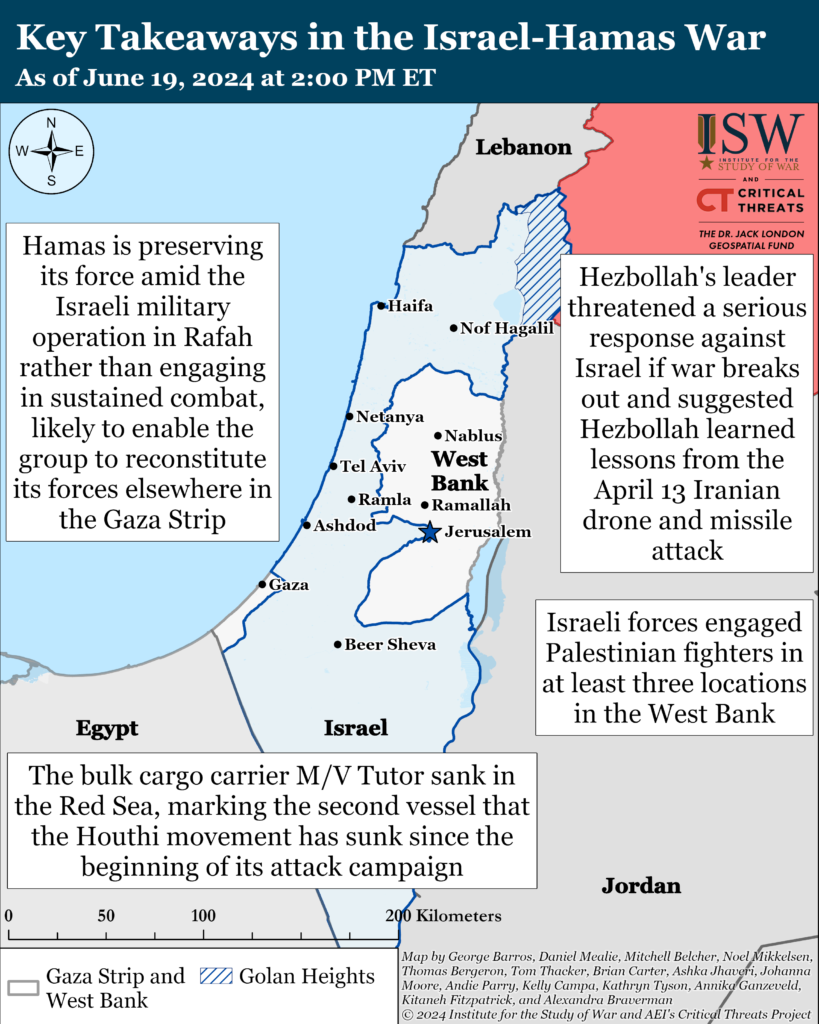
Gaza Strip
Axis of Resistance objectives:
Erode the will of the Israeli political establishment and public to sustain clearing operations in the Gaza Strip
Reestablish Hamas as the governing authority in the Gaza Strip
Palestinian militias conducted five indirect fire attacks targeting Israeli forces in southern Gaza City on June 19. The militias fired mortars and rockets at Israeli forces operating in eastern Zaytoun and along the Netzarim Corridor.[xlv]
Israeli forces continued operations in Rafah on June 19. The IDF 12th Brigade killed several armed fighters near a humanitarian equipment warehouse where Hamas also kept rocket launch systems.[xlvi] The Democratic Front for the Liberation of Palestine fired at Israeli forces in Yabna refugee camp in central Rafah.[xlvii]
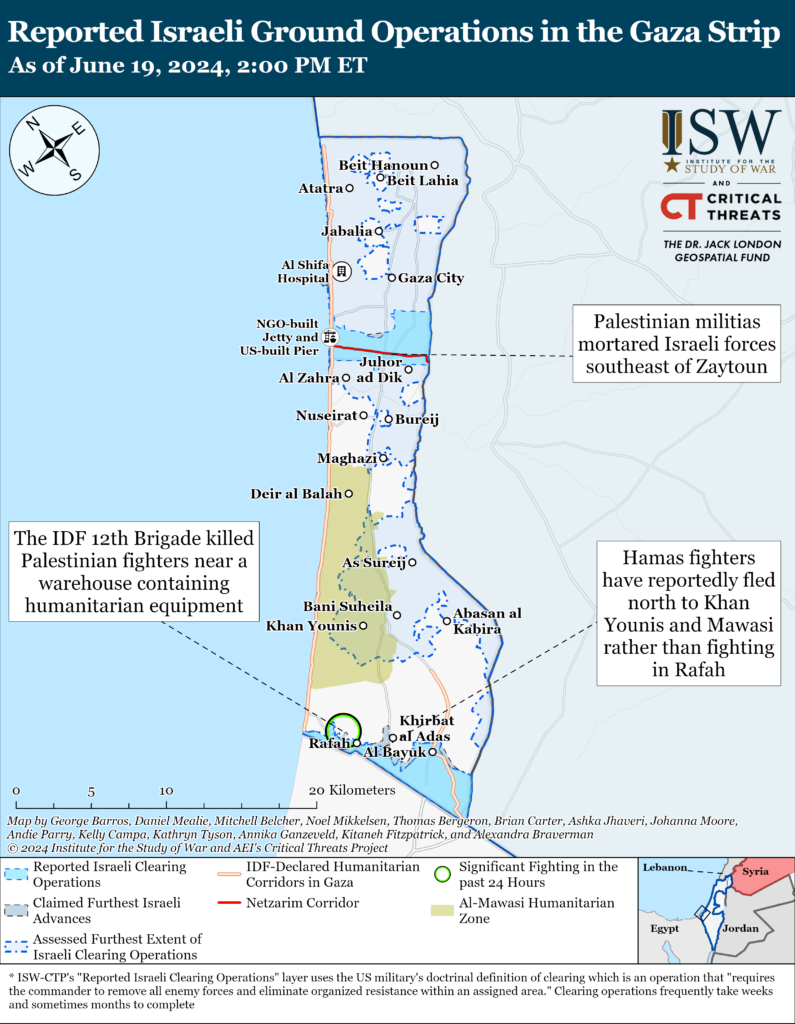
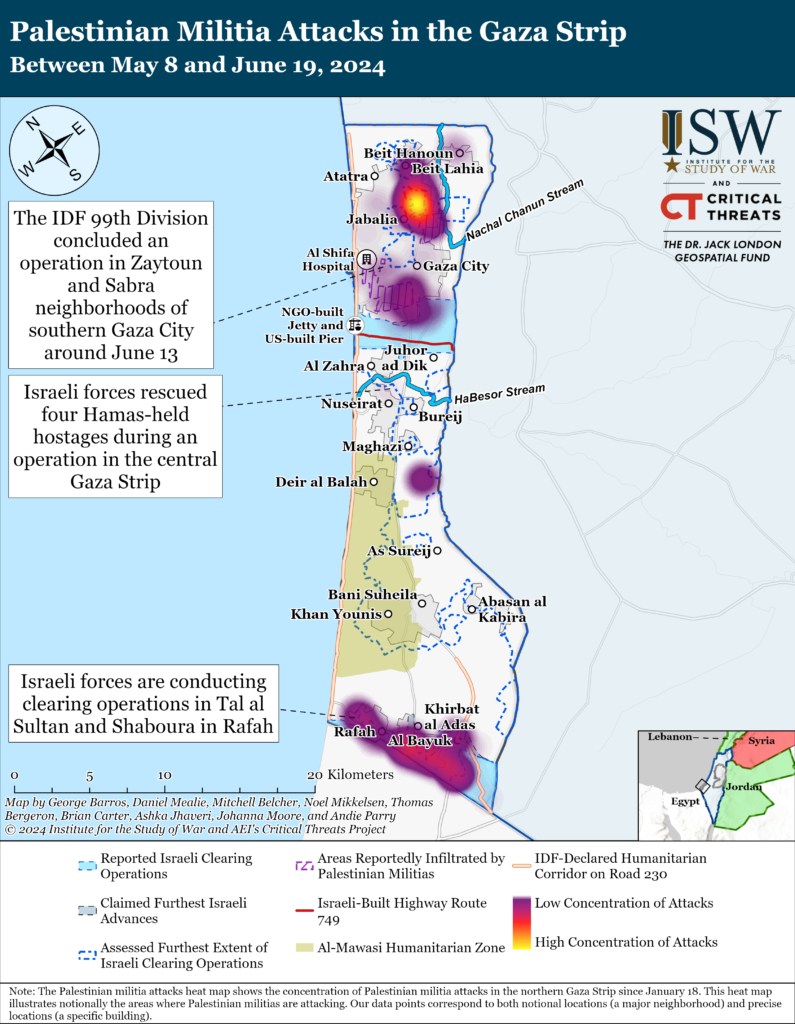
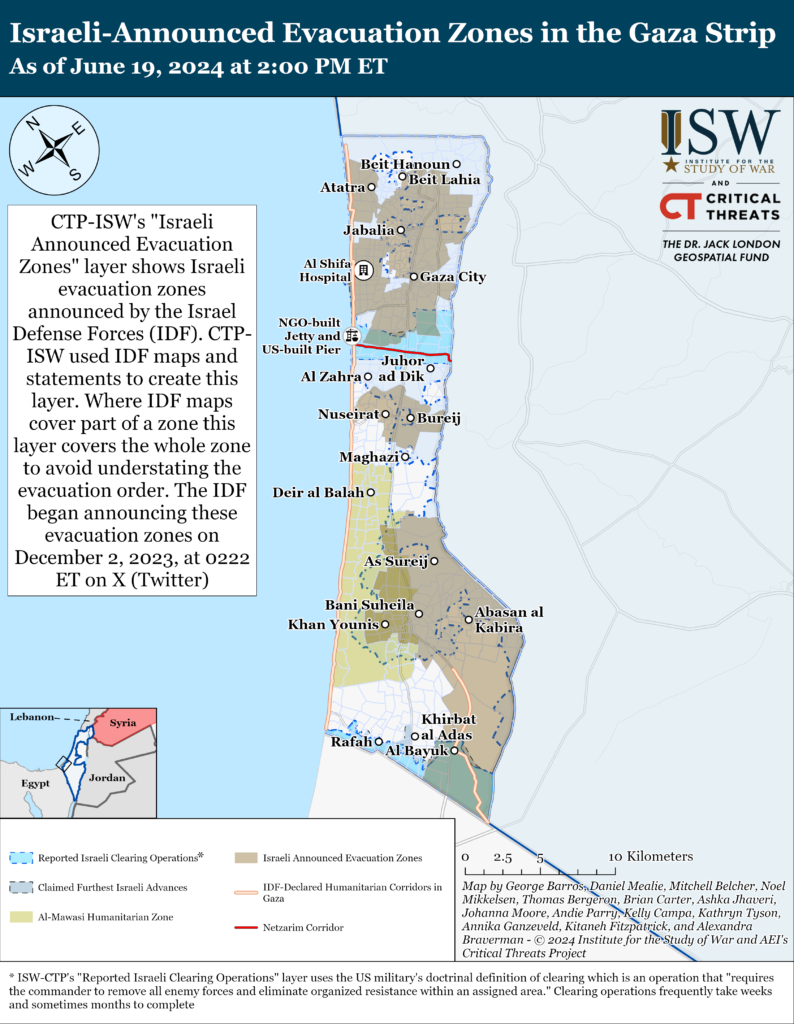
Israeli Prime Minister Benjamin Netanyahu criticized the United States on June 18 for “withholding” unspecified weapons and ammunition transfers to Israel.[xlviii] Netanyahu said that he discussed the delays with US Secretary of State Antony Blinken during Blinken’s visit to Israel on June 10.[xlix] White House Press Secretary Karine Jean-Pierre stated in response to Netanyahu‘s statement that the Biden administration ”genuinely do[es] not know what he is talking about.”[l] Pierre stated that the United States has only paused one weapons shipment since the war began, referring to the Biden administration’s decision to halt the transfer of 2,000lb bombs to Israel at the start of the IDF’s offensive into Rafah in May 2024.[li] The Biden administration canceled a June 20 meeting between Israeli security officials and several US agencies to discuss Iran in response to Netanyahu’s comments.[lii]
The United States may dismantle the US-built temporary pier next due to deteriorating sea conditions in the eastern Mediterranean, according to military officials who spoke to unspecified aid organizations.[liii] The Biden administration originally estimated that the pier could handle sea conditions until September 2024.[liv] US Central Command (CENTCOM) detached the pier from the Gaza Strip on June 14 to prevent damage from “high seas.”[lv] Pentagon Press Secretary Air Force Maj. Gen. Pat Ryder said on June 18 that he expects the pier to become operational again sometime “this week.”[lvi] Unspecified US military officials told the New York Times that the pier will likely fall short of its aid goals.[lvii] The pier has reportedly been in service for only 10 days since it began operations on May 17.[lviii]
Hamas launched an attack drone targeting an Israeli town near the southern Gaza Strip on June 18.[lix] Palestinian militias have not launched a drone from the Gaza Strip targeting Israel since February 2024.[lx] Palestinian fighters also launched rockets targeting Ashkelon and an Israeli town bordering the northern Gaza Strip on June 19.[lxi]
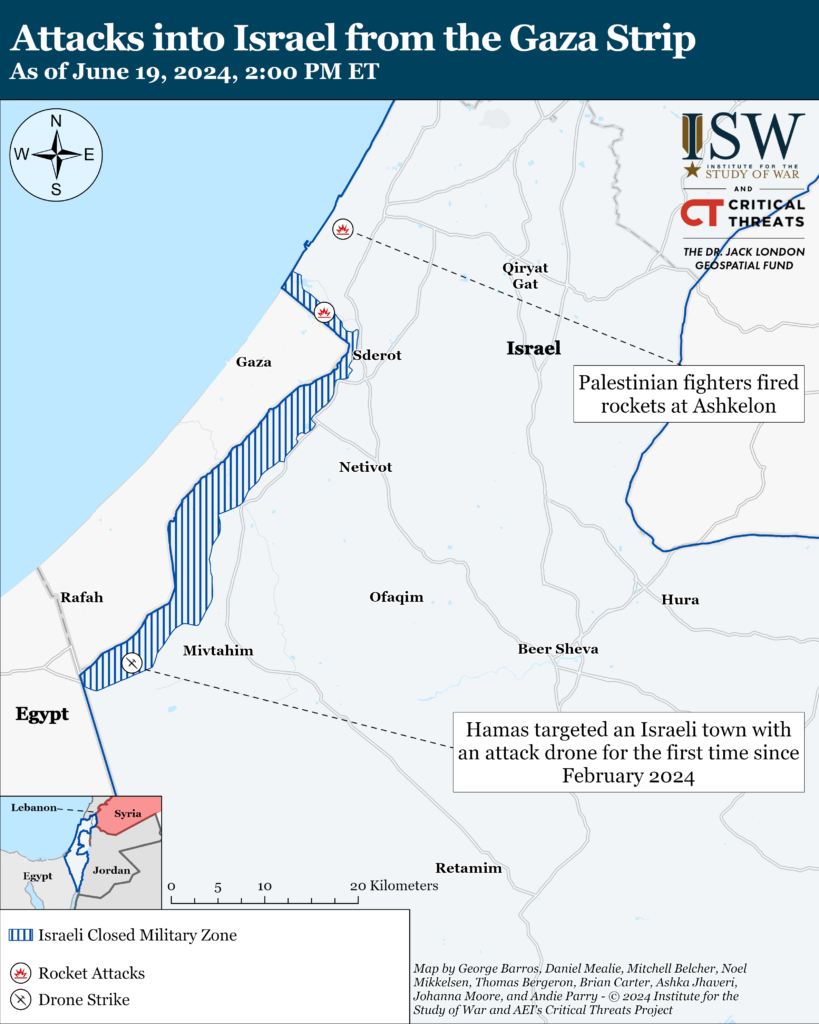
Recorded reports of attacks; CTP-ISW cannot independently verify impact.
West Bank
Axis of Resistance objectives:
Establish the West Bank as a viable front against Israel
Israeli forces have engaged Palestinian fighters in at least three locations in the West Bank since CTP-ISW’s last data cutoff on June 18.[lxii] The al Quds Brigades fired small arms and detonated improvised explosive devices (IED) targeting Israeli forces in Silat al Harithiya, northwest of Jenin.[lxiii]
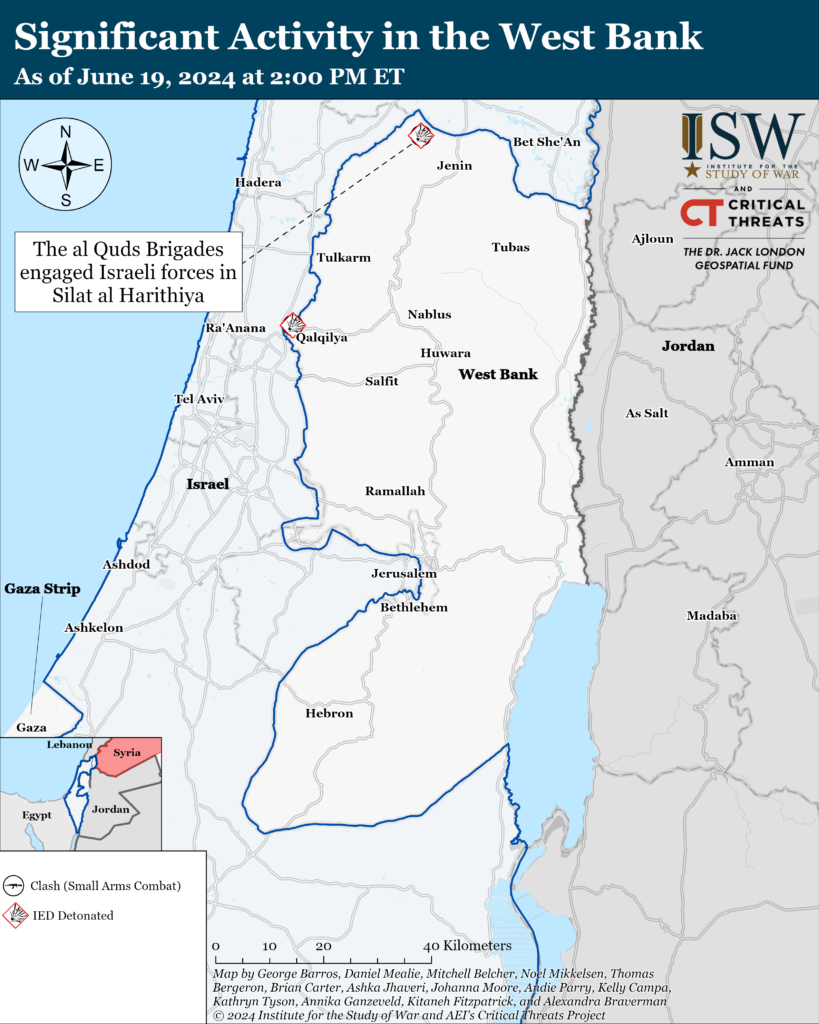
This map is not an exhaustive depiction of clashes and demonstrations in the West Bank.
Southern Lebanon and Golan Heights
Axis of Resistance objectives:
Deter Israel from conducting a ground operation into Lebanon
Prepare for an expanded and protracted conflict with Israel in the near term
Expel the United States from Syria
Iranian-backed militias, including Lebanese Hezbollah, have conducted at least ten attacks into northern Israel since CTP-ISW’s last data cutoff on June 18.[lxiv]
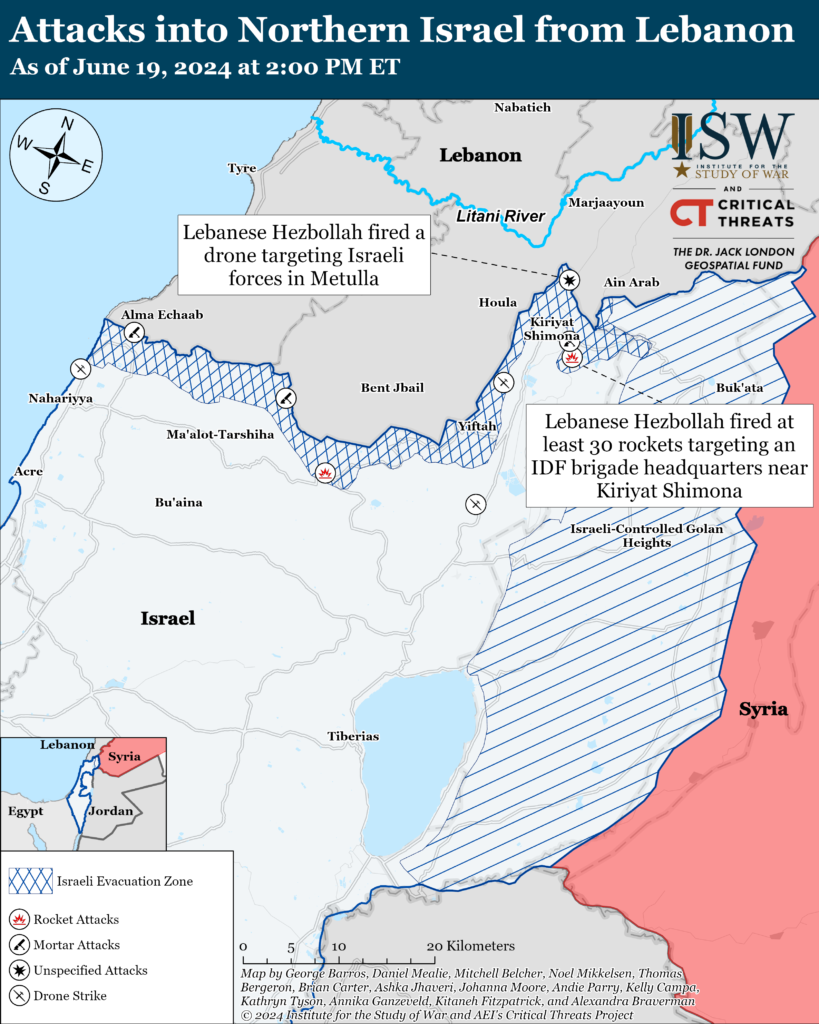
Recorded reports of attacks; CTP-ISW cannot independently verify impact.
Iran and Axis of Resistance
The IDF likely conducted airstrikes targeting two Syrian Arab Army (SAA) sites in Daraa and Quneitra provinces, Syria, on June 19, in retaliation for the SAA cooperating with Lebanese Hezbollah. The Syrian Defense Ministry claimed that Israel conducted an airstrike targeting two SAA sites near Quneitra and Daraa in southern Syria, killing one SAA officer.[lxv] Syrian sources reported that Hezbollah uses the targeted sites as reconnaissance and observation points to observe the Israel-controlled Golan Heights.[lxvi] The IDF dropped leaflets over Syrian villages in Quneitra after the airstrike warning the SAA against engaging in intelligence cooperation with Hezbollah and threatening further action if Hezbollah continues to operate at SAA sites.[lxvii] The leaflets included a map identifying two SAA sites—Tel Ahmar and Hanout—that host concentrations of Hezbollah fighters and that the IDF has previously targeted multiple times.[lxviii] The IDF stated in 2020 that the SAA’s 1st Corps, which is responsible for areas of southern Syria near the Golan Heights, is closely affiliated with Lebanese Hezbollah.[lxix]
Acting Iranian Foreign Affairs Minister Ali Bagheri Kani met with Qatari Prime Minister Mohammad bin Abdul Rahman bin Jassim al Thani in Doha on June 19 to discuss the Israel-Hamas war.[lxx] Iranian media has not published any readouts of their meeting at the time of this writing. Qatar has been one of two major Arab mediators between Israel and Hamas. Egypt is the other mediator.
Reformist presidential candidate Masoud Pezeshkian surpassed hardline candidates Mohammad Bagher Ghalibaf and Saeed Jalili in a recent poll.[lxxi] A former Iranian state media official published the poll following the June 17 presidential debate. Twenty-eight percent of survey respondents expressed support for Pezeshkian, while 26 and 24 percent expressed support for Ghalibaf and Jalili, respectively. Google searches for Pezeshkian also increased following the June 17 debate.[lxxii]
The bulk cargo carrier M/V Tutor sank in the Red Sea on June 18, marking the second vessel that the Houthi movement has sunk since the beginning of its attack campaign targeting international shipping in November 2023.[lxxiii] The Houthis launched a remote-controlled, one-way attack naval surface drone targeting the Liberian-flagged, Greek-owned Tutor on June 12.[lxxiv] The Houthis later launched a ballistic missile at the vessel.[lxxv] The impacts flooded the engine room, and the US Navy airlifted the crew from the vessel on June 15.[lxxvi] The United Kingdom Maritime Trade Operations reported that the Tutor sank approximately 67 nautical miles southwest of Hudaydah, Yemen, on June 18.[lxxvii] Philippine government officials said that one Philippine crewmember remains missing.[lxxviii] A British maritime security firm separately reported that one crewmember died in the attack.[lxxix] It is unclear if these two crewmembers are separate individuals. The Tutor is the second vessel the Houthis have sunk since November 2023. The Houthis previously struck the UK-owned bulk carrier Rubymar with ballistic missiles in the Bab al Mandab Strait in February 2024, causing the vessel to sink.[lxxx]
The Houthis’ attack on the Tutor also marked the first time the Houthis have used an explosive-laden uncrewed surface vessel (USV) to attack a commercial vessel. Crewmembers described the USV as a long white-hulled 5–7-meter vessel manned with two dummies that resembled a Yemeni fishing boat.[lxxxi] The Houthis have used dummies in previous attempted attacks to draw fire while a second nearby skiff directed the USV.[lxxxii] The Houthi movement will likely use its success in damaging the Tutor to inform how it will employ USVs against commercial targets in the Red Sea in the future.
Reuters reported on June 19 that traumatized seafarers are refusing to sail in the Red Sea as a result of Houthi attacks, adding to a growing shortage of seafarers and officers.[lxxxiii] Reuters interviewed over 15 crew members and shipping industry officials who stated that seafarers are hesitant to sail through the Red Sea due to constant Houthi attacks.[lxxxiv] The International Transport Workers’ Federation (ITF) requested in March 2024 to expand the Warlike Operations Area (WOA) in the Red Sea and Gulf of Aden to reflect the danger that Houthi attacks pose on seafarers.[lxxxv] The WOA currently extends from the southern Red Sea and Gulf of Aden across the Eritrea coast, including the Bab al Mandeb Strait.[lxxxvi] An ITF agreement grants nearly 360,000 seafarers the contractual right to refuse to sail in designated war zones. Reuters reported that many shipping companies and shipowners have decided not to sail through the Red Sea, impacting costs and time as companies choose to sail the longer and more expensive route around Africa instead.[lxxxvii] The Houthis have repeatedly expressed their objective of disrupting international shipping through the Red Sea as a part of the Iranian-led effort to impose an unofficial blockade on Israel. [lxxxviii]
US CENTCOM destroyed eight Houthi drones in Houthi-controlled areas of Yemen on June 18.[lxxxix] Houthi media claimed that the United States and the United Kingdom conducted three airstrikes targeting the Taif area, al Durayhimi District, south of Hudaydah.[xc] CENTCOM also reported that partner forces destroyed one Houthi drone over the Gulf of Aden.[xci]
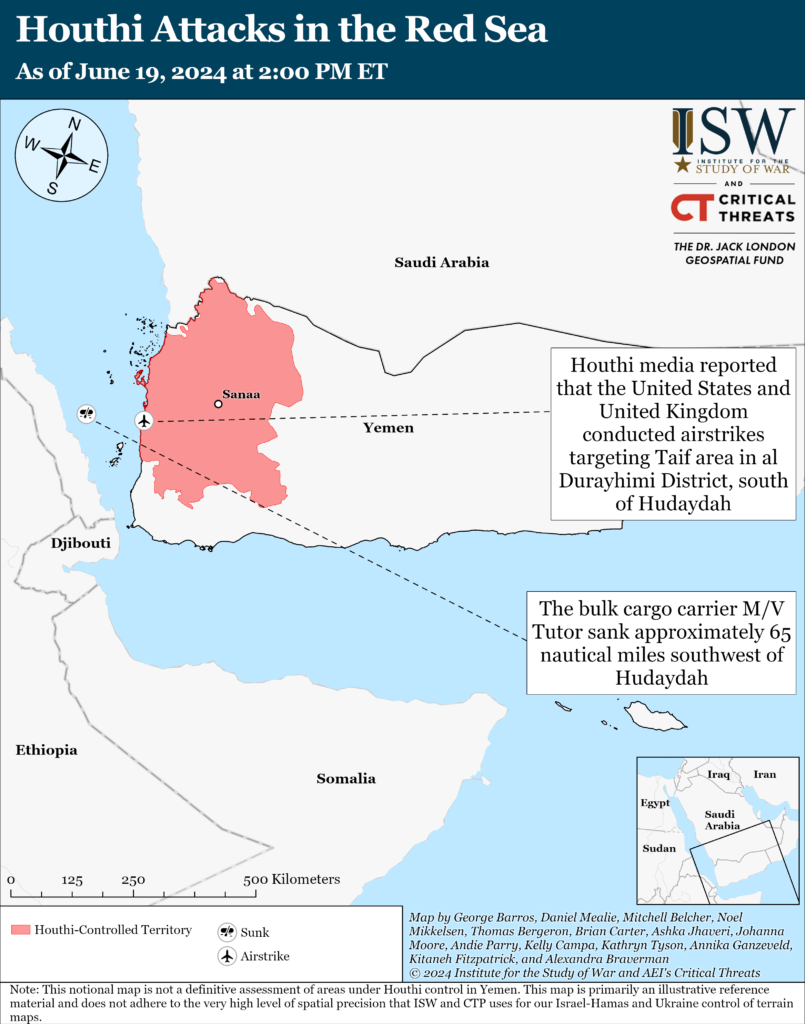
 Eurasia Press & News
Eurasia Press & News
